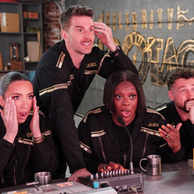IT'S A SIN: WRITER RUSSELL T. DAVIES AND STAR OLLY ALEXANDER TALK ABOUT THE NEW SERIES
- Jan 16, 2021
- 5 min read
It’s A Sin is Russell T Davies’ brand new 5-part drama which follows the story of the 1980s, the story of AIDS, and charts the joy and heartbreak of a group of friends across a decade in which everything changed.
Olly Alexander leads a cast which also features Keeley Hawes, Stephen Fry, Neil Patrick Harris, Tracy Ann Oberman, Shaun Dooley, Omari Douglas, Callum Scott Howells, Nathaniel Curtis and Lydia West.

Interview with Russell T. Davies
Please tell us, in a nutshell, what the series is about.
Well, it's the story of the 1980s. It's the coming of age story of five 18 year old people who all converge on one flat in London, leaving home, growing up together. It's the decade in which the shadow of a virus is falling across all of our lives. The five episodes cover 10 years 1981 to 1991. So, as we see these young kids grow up, come out, make friends, fall in love, find work, discover who they are, at the same time the virus gets closer and closer, hitting people in their social life and heading towards the flat itself. And it's about how they cope with that and it's how they survive that. It's about how they celebrated each others' lives in the face of such darkness.
Would it be fair to describe this as one of your most personal projects to date?
It probably is actually. I didn't realise until I started writing it how exactly it fits my own life. I was 18 in 1981. I didn't really have to reach for the cultural references, the songs, and television shows, or the fashions, because I lived through them all. I mean, I think everything I write is very personal. I could equally say how close I am to Rose Tyler, and she's flying through another galaxy, but yes, this was something I built up to writing for many years.
There hasn’t really been a drama of this scale exploring the British experience of the AIDS crisis until now. Why do you think that is?
Yes, I wanted to see the British perspective. It does exist, it's there in films like Pride, very beautifully stated, and there's this whole body of work that I've seen: The Inheritance and Angels in America are among the finest things that have been written, and along with The Normal Heart there's a wonderful film called Holding The Man, and there's London Spy which features an HIV diagnosis scene that is a phenomenal piece of work. So I was very aware of those pieces of work. But I very much wanted to find my own place alongside them, not repeating what they've done. And in some ways, the urge to be new is the least important thing. Because it's stories like this that need restating again, and again. I'm very aware that younger generations are growing up not knowing anything about this period. And actually, let's be honest, people who were there at the time don't know anything about it either. And there are those who have happily forgotten such a bad time, and I don't blame them for that. So it was a matter of me finding my place in there. It's an awful subject, it's a delicate subject, but it's an honour to write about it.
One of the most devasting elements for victims of the AIDS crisis was the accompanying stigma and shame. At the same time the wider gay community suffered rife prejudice as a result of the virus too. How far do you think we’ve come since those times?
Things are a million times better. People said we were the love the dare not speak its name. And then along came a disease that dare not speak its name. Double calamity. Obviously, things have got better, radically better in my lifetime. In 1999, I wrote an out gay 15-year-old schoolboy, and he was as rare as a comet. Now, that's not so rare. It's really quite commonplace in most schools now (it's still terrible if you're in the closet, and I'm not saying all the problems are gone of course). But the prejudice lingers. You just ask people you know, ask a gay man, "do you know if it's safe to be around someone with HIV if they're sneezing?" And many people don't know the answer to that. So there's still a lot of ignorance. Nonetheless, it is a much, much better world than it used to be. I've noticed over the past five years the numbers of friends of mine who feel free to tell me their HIV status has increased by tenfold. It still used to be a secret, but in the past five years, I can notice people being much freer about talking about it.
Interview with Olly Alexander
Tell us a little about your character, Ritchie.
Richie is born and raised on the Isle of Wight. He's one of those kids who wants to get out of his small town and escape to London as soon as he can. He's very ambitious, likes to be the centre of attention and the life of the party.
It’s been a while since you last acted, what was it about It’s A Sin that drew you back to acting?
Hearing that Russell was making something new, that was enough for me to want to be involved. Russell's such an iconic voice in British storytelling, and especially queer storytelling, and I would have done anything to work with him. And that was before I'd even read the script. Once I read the script I was like, "oh, holy shit, this is amazing". And then when I read Ritchie, I just really fell in love with him, and how complicated he is, and how moving the story was. I thought, "Wow, I would be so so so lucky to get a chance to be a part of this".
The drama is set almost 40 years ago – what do you think young people today might be able to take from It’s A Sin?
At its heart, the story is so universal. Anyone that's ever experienced growing up or falling in love, having their heartbroken, can empathise with what all these characters go through. Also, I personally have realised how many people are unaware of this specific moment of history and how people were treated, the lives that were impacted, and how those lives were impacted. I think it's going to be quite eye opening for a lot of people. Just speaking as a gay man, it's a really important part of our queer history, and that we share it. And I think it's really helpful to understand some of the ways in which homophobia has persisted and the ways in which the AIDS crisis really, really impacted such a huge community. And in many ways the legacy still remains today, and I think it helps shed some light on a really complicated issue that doesn't get spoken about very much. And it does that by telling a really moving and beautiful story about real people that I think anyone can relate to.
It's A Sin begins Friday 22 January at 9pm on Channel 4.
[Source: Channel 4 Press]


































